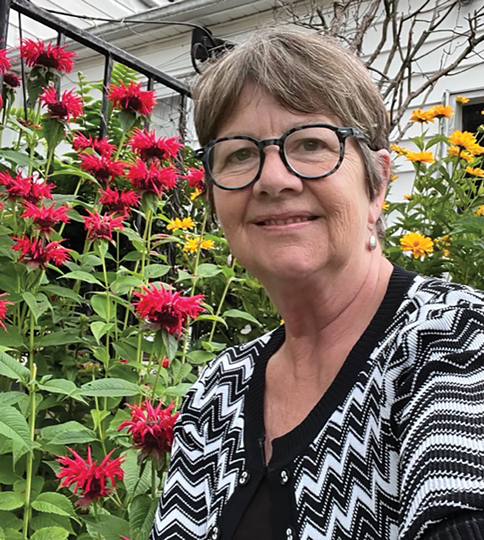City of Kingston/Frontenac County
Tracey Snow

With a heightened awareness of food security, Kingston’s strategic plan includes a focus on urban food production and protection of agricultural lands, given that around 80 per cent of the municipality’s land area is rural.
As the city’s first manager of rural and community economic development, Tracey Snow plays a key liaison function with stakeholders in implementing these strategic priorities. Snow draws on previous experience as a senior economic development manager in the neighbouring county of Lennox & Addington and as a regional marketing manager and owner-operator with the Tim Hortons restaurant chain.
Snow highlights progress with the city’s community training farm on approximately five acres of land donated by Correctional Services Canada. With the support of St. Lawrence College for the trades training portion of the program, the farm is operated under contract by Loving Spoonful, a local not-for-profit organization.
OBJ360 (Sponsored)

Foster employee wellness and show your appreciation with Ingenium
Helping employers better connect with employees, and their families, is the thinking behind the corporate memberships offering from Ingenium.

Wonder and amazement is what you’ll discover at these Ottawa museums
This summer, embark on a journey where curiosity knows no bounds by stepping into the world of innovation and wonder at these Ottawa Museums.
The farm has already placed trainees on local farms and other agricultural operations and, according to Snow, is going from strength to strength thanks to renewed provincial funding.
Snow is also enthusiastic about the revitalization of the Kingston Public Market, founded in 1801 and possibly the oldest public market in Ontario. She works closely with neighbouring municipalities to support the Kingston region and the rest of Eastern Ontario.
United Counties of Leeds and Grenville
Robert Dalley
The fact that the aging superstructure of the mammoth grain terminal at the Port of Johnstown has managed to continually handle millions of tonnes of grain per year is in large part due to Robert Dalley, the port’s general manager since 2008.

Dalley has drawn on extensive logistics experience, including time as national manager for process improvement with Supply Chain Management (now Walmart Logistics) in Cornwall.
Although the Port of Johnstown with its massive concrete grain elevators built in the 1930s lost its primary raison d’être with the opening of the St. Lawrence Seaway in 1959, it continued to operate as a federal port until 2000, when it was purchased for a nominal sum by the Township of Edwardsburgh Cardinal.
The facility has continually evolved, diversified and expanded as a key intermodal transportation hub for Eastern Ontario. It has generated millions of dollars in handling charges that have also produced substantial annual surpluses primarily used for reinvestment back into the port for its sustainability, but also used by the township to help improve municipal services and minimize tax increases.
Looking ahead, Dalley sees the main challenge as how to extend the lifespan of the terminal’s concrete silos because this material steadily deteriorates over time. Dalley is quick to share his appreciation for the port’s staff of around 30 full-time and seasonal employees, including an operations manager for the grain terminal itself.
He feels that there is still plenty of opportunity ahead for this community-owned port.
Stormont, Dundas and Glengarry United Counties
Jackie Kelly-Pemberton
Jackie Kelly-Pemberton is the current Ontario Federation of Agriculture (OFA) director for Zone 11, representing OFA members in the counties of Frontenac, Leeds and Grenville, and Dundas.
In this role, she is known as an agricultural representative with an environmental focus.
Her involvement with practical farming began when sh

e married Steven Pemberton and moved to Pemdale Farm, a third-generation family farm on Pemberton Road near Winchester, where they produce cash crops on 200 acres and run a small beef cow-calf operation of around 25 head.
She started her career as the environmental manager at the Parmalat (now Lactalis) dairy plant in Winchester. She then worked as a consultant with Apedaile Environmental in Ottawa on the use of non-agricultural source materials (NASM) as fertilizer on local farmland.
As a member of the Raisin-South Nation source water protection committee, she works on policy and implementation measures to protect source water under the province’s Clean Water Act and also serves on several other water- or environment-related bodies.
A graduate of the Rural Institute of Ontario’s Advanced Agricultural Leadership Program, she received its Richard Lichty Memorial Award for demonstrating “a passion for rural communities and agriculture and faith in the ability of people to make a difference.”
In 2021, Pemdale Farm was awarded the prestigious Beef Farmers of Ontario (BFO) Environmental Stewardship Award for the farm’s contributions on a wide range of environmental protection fronts, such as stored manure runoff, cover crop rotation, tree planting, windbreaks, buffer strips, wildlife habitat, bird boxes and pollinator hedgerows.
Lanark County and Renfrew County
Jennifer Doelman

Granddaughter of renowned pedigree seed grower Barclay Dick, Jennifer Doelman is very much a leading farm figure in her own right.
After graduating from the University of Guelph in 2003 with an agricultural science degree and a minor in agricultural communications at the University of Guelph, she and her husband Michael worked with her father on the family farm on Barr Line Road in Douglas, a small rural hamlet east of Renfrew.
During this time, she and Michael became part owners of the farm, while she flourished on several other fronts: as an independent certified crop advisor, an alumna of the Rural Ontario Institute’s Advanced Agricultural Leadership Program (AALP), a professor in Algonquin College’s Agricultural Business Diploma Program, and an active member in many farm organizations, including the Ontario Federation of Agriculture, for which she currently serves as the provincial director for Zone 8 (Arnprior, Lanark, Renfrew and Ottawa).
Doelman and her husband now have their own operation, Bonnechere Haven Farms, just down the road from her parents. As the mother of two young children, Doelman explains that she and Michael have to focus on developing their own farm and be more selective in their off-farm roles.
For example, she will not be running again as OFA director when her second term ends in November.
“I hope to be back again someday,” she adds, “I loved the role and being able to serve members and be a cheerleader for the amazing agricultural community.”
United Counties of Prescott and Russell
Patrick Therrien

As CEO for the past eight years of the Coopérative agricole d’Embrun (Coop Embrun or Embrun Co-op), founded in 1943, Patrick Therrien has, by all accounts, not only transformed the organization, but also helped transform Embrun itself with distinctive corporate branding from one end of the town to the other.
With some 4,000 members (both farmers and consumers), $88 million in annual sales, $40 million in assets and around 250 staff, the Co-op had been a longstanding mainstay of the local economy but was looking to modernize and revitalize itself when Therrien was headhunted from nearby Coop Agrodor, just across the Ottawa River in Thurso, Que.
With an undergraduate degree in agronomy and a master’s degree in business administration from Laval University in Quebec City, as well as 12 years’ prior experience in co-operative management in Quebec and Eastern Ontario, Therrien brought a solid track record to his new role.
In collaboration with the Co-op’s board of directors, he has overseen a fundamental rebranding of the Co-op’s image, instituted a comprehensive strategic planning process, established several new strategic partnerships (especially as part of the Great Lakes Grain group) and pivoted the Co-op away from its original identity as a primarily francophone organization.
The Embrun Co-op currently operates eight divisions: five farming-related and two consumer-related.
As dairy farmer Michael Bols, the Co-op’s current president, puts it: “Our members are grateful to Patrick for helping give us much more pride in our organization.”
Visit eobj.ca for more power people and news from across Eastern Ontario, including the 2023 crop of fastest-growing companies in the region.





